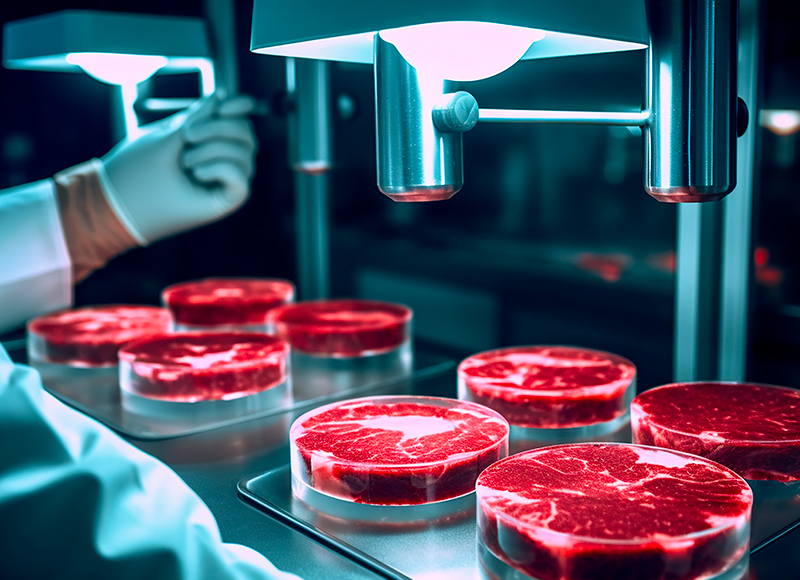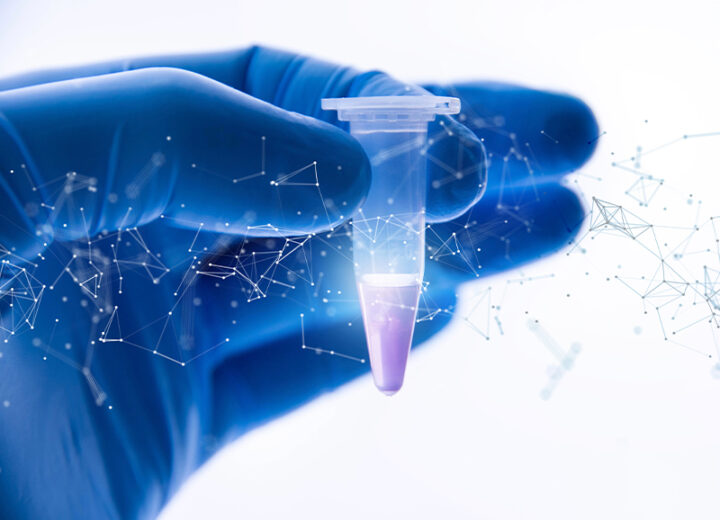23 July 2024
The critical role of recombinant proteins in cultivated meat

The cultivated meat industry is an innovative sector focused on producing meat through cell culture techniques. Undeniably, it has been gaining momentum as a sustainable alternative to traditional meat production since 2013.
A critical ingredient in this advancement is the use of recombinant proteins. These are are essential for the manufacturing process. They help to develop growth media that support cell proliferation and differentiation. Below, we’re exploring the impact of recombinant proteins on the cultivated meat industry, highlighting how these proteins are crucial for the industry’s growth.
We’ll also discuss our unique approach of using natural bioreactors to produce growth factors and other essential proteins. This process is more cost-effective, efficient, and how is creating economically viable cultivated meat production.
Read on to learn more.
The role of recombinant proteins in cultivated meat production
Cultivated meat production involves growing meat cells. In a controlled environment, growth cell culture media rich in essential nutrients are used. Recombinant proteins, particularly growth factors, are key components of these media, as they regulate cell proliferation and differentiation.
By providing the necessary signals for cells to grow and mature, recombinant proteins ensure the efficient and consistent production of cultivated meat.
Growth factors such as transforming growth factors (TGFs) are commonly used in the cultivation process. By mimicking the natural growth signals in animal tissues, TGFs promote the development of muscle, fat, and connective tissue cells. The precision and consistency of recombinant proteins enable the production of high-quality cultivated meat that closely resembles conventional meat in taste, texture, and nutritional profile.
Growth media: the backbone of cultivated meat
The development of effective growth media is fundamental to the success of cultivated meat. These media provide the nutrients, growth factors, and culture conditions necessary for cells to thrive. Moreover, the inclusion of recombinant proteins in growth media has proven to be a game-changer. For example, recombinant insulin is commonly used to help cells take in glucose, providing energy and encouraging growth.
Similarly, researchers use recombinant albumin, a protein found in blood plasma, to stabilize growth media and enhance cell viability.
Recombinant technologies help keep cultured meat cells healthy and growing by providing them with the necessary proteins consistently during production.
Recombinant proteins and cell differentiation
Cell differentiation is another critical process in cultivated meat production. It involves transforming stem cells into specialized cells such as muscle cells, fat cells, and connective tissue cells.
Recombinant proteins play a crucial role in guiding this differentiation process.
For instance, myogenic regulatory factors (MRFs) help create muscle fibers, while adipogenic factors support the growth of fat cells.
The ability to precisely control cell differentiation through recombinant proteins allows for the creation of meat with the desired composition and characteristics.
This ability is important for creating lab-grown meat that tastes like traditional meat and meets nutritional and cooking standards.
Check out our guide to recombinant protein growth factors.
Future trends and innovations in recombinant proteins for cultivated meat
The future of the cultivated meat industry is bright, with continuous innovations in recombinant protein technology driving further advancements. As we look ahead, we see several trends and innovations that will enhance the quality and sustainability of cultivated meat.
Enhanced growth media formulations
Future innovations will focus on developing optimized growth media formulations that combine various recombinant proteins to support different stages of cell growth and differentiation. By fine-tuning the composition of growth media, we can improve the efficiency of cell culture processes, resulting in higher yields and better-quality cultivated meat.
Custom recombinant proteins
Advancements in recombinant protein technology will enable custom growth factors tailored to specific cell types and species. This will allow for the production of a wider range of cultivated meat products, including beef, chicken, pork, and seafood.
Learn more about our very own custom development solutions today.
Sustainable production methods
Sustainability will continue to be a key focus in the cultivated meat industry. Innovations in recombinant protein production will play a crucial role in reducing the environmental impact of cultivated meat production. For example, the use of insect bioreactors. By adopting sustainable methods, we can ensure that cultivated meat is not only a viable alternative to traditional meat but also a more environmentally friendly option.
Making growth factors accessible and affordable
Unfortunately, one of the major challenges in the cultivated meat industry is the high cost of growth media. This is primarily due to the expensive growth factors. Therefore, making these recombinant proteins more accessible and affordable is essential for achieving scalable cultivated meat production.
The cost of recombinant proteins is influenced by the complexity of their production and purification processes.
YOU MAY LIKE: The role of affordability in recombinant protein production
At Cocoon, we’re addressing this challenge by using insects as natural bioreactors. This allows us to produce growth factors at a fraction of the cost of traditional methods.
By providing affordable and high-quality growth factors, we enable cultivated meat producers to scale up their operations and bring their products to market at competitive prices. This accessibility is crucial for the widespread adoption of cultivated meat, making it a viable alternative to conventional meat and contributing to global food security.
Committed to advancing the cultivated meat industry
By supporting the development of scalable and economically viable cultivated meat production, we are contributing to a more sustainable and secure food future.
We’re also dedicated to continuous innovation. Our team are always exploring new ways to enhance the quality and sustainability of cultivated meat. Our focus on custom recombinant proteins and optimized growth media formulations ensures that we remain at the forefront of the industry. We’re committed to providing solutions that meet the evolving needs of cultivated meat producers.
Learn more about our revolutionary CrisBio® platform and discover how our custom recombinant protein solutions can advance the cultivated meat industry today.
Let’s harness the power of recombinant proteins to transform the cultivated meat industry and create a sustainable future for food production.


